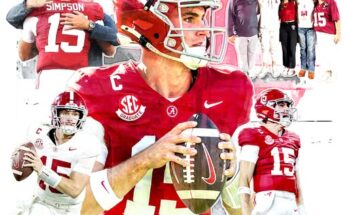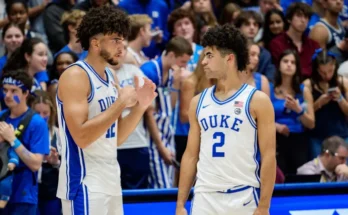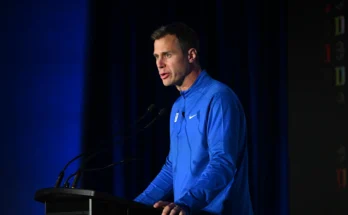Why Alabama Football Shouldn’t Name a Starting Quarterback Until August
In the high-stakes world of Alabama football, every decision is dissected under a microscope. Few choices carry more weight than selecting the starting quarterback. As the Crimson Tide prepare for their first season in the post-Nick Saban era, there is growing anticipation—and pressure—around who will take the reins under center. With a talented quarterback room and a new coaching staff led by Kalen DeBoer, fans and pundits alike are eager for clarity. But rushing the decision would be a mistake. Here’s why Alabama shouldn’t name a starting quarterback until August.
Competition Breeds Excellence
One of the cardinal rules in college football is that competition makes players better. By delaying the decision until fall camp, DeBoer and his staff can ensure that each quarterback has a legitimate opportunity to win the job. This isn’t just about fairness—it’s about pushing each signal-caller to their highest potential.
Alabama has several strong contenders for the starting role. Jalen Milroe, who started most of last season and helped guide the Tide to an SEC title and College Football Playoff appearance, returns with unmatched athleticism and game experience. Then there’s Ty Simpson, a highly touted recruit with a cannon for an arm, who continues to develop. And don’t forget Dylan Lonergan, the redshirt freshman who’s been turning heads in practices. All of them bring something different to the table.
By keeping the competition open into August, DeBoer ensures that complacency doesn’t set in. Each rep in practice will matter. Every throw will be scrutinized. That type of pressure simulates game-day intensity and creates a sharper, more focused quarterback room.
A New Offensive System Requires Time
Kalen DeBoer and new offensive coordinator Nick Sheridan are installing a fresh playbook in Tuscaloosa. While DeBoer’s offensive philosophy emphasizes balance, verticality, and precision, the reality is that no quarterback on Alabama’s roster has played a snap in his system yet. Rushing to name a starter before all quarterbacks have a full summer and fall camp to absorb the offense would be premature.
Unlike under Saban, where systems were often tailored to veteran coaching styles, DeBoer’s scheme requires time and mental reps to master. His quarterbacks at Washington, including Michael Penix Jr., thrived after months of learning and refining their decision-making within the system. Allowing the full off-season for quarterbacks to internalize the playbook, develop chemistry with receivers, and build confidence in new concepts is essential.
A premature decision based solely on spring practice or past performance could favor familiarity over fit. The quarterback best suited for DeBoer’s offense might not shine until fall camp, when the system starts to click and tempo increases. Giving it time ensures that the most prepared and most compatible quarterback gets the job.
Leadership Emerges Over Time
The quarterback isn’t just another position—it’s the leader of the offense. Beyond arm strength or mobility, the starter must command the huddle, direct teammates, and inspire confidence. Leadership can’t always be measured in stats or spring-game highlights; it’s revealed over time.
By extending the competition into August, Alabama gives each candidate a chance to prove they can lead. Teammates notice who stays late for film study. They see who takes ownership of mistakes and who lifts others up after tough practices. Sometimes, the best leader isn’t the most vocal or the flashiest—it’s the one who earns respect day in and day out.
Naming a starter too early could stifle that organic leadership development. Delaying the announcement allows those intangible qualities to emerge, ensuring that the eventual QB1 isn’t just the most talented but also the most trusted.
Avoiding Locker Room Division
One of the most delicate dynamics in a football program is the quarterback competition. Pick a winner too soon, and you risk alienating others in the room or creating friction among position groups. Particularly in the modern era of the transfer portal and NIL, managing egos and relationships is more important than ever.
If the coaching staff names a starter prematurely and then has to walk it back later—or worse, sticks with the wrong choice—dissatisfaction can spread. Waiting until August allows for a more organic resolution. Players and coaches alike will have more information. There’s less room for debate when the decision is made after weeks of intense fall camp competition, rather than on projections from spring or summer.
DeBoer must strike a careful balance between transparency and competition. Waiting ensures that when the starter is named, the team accepts it because they’ve seen the battle play out in full.
The Transfer Portal Wildcard
In today’s college football landscape, the transfer portal is a reality that every coaching staff must account for. By delaying the QB decision, Alabama can better manage the roster and avoid unnecessary attrition.
If a starter is named in May or June, other quarterbacks—especially those with multiple years of eligibility—might consider transferring before the season even begins. By keeping the competition open, DeBoer can retain depth heading into the fall. Injuries happen. Slumps occur. Having multiple prepared and engaged quarterbacks on the roster is invaluable.
Moreover, by not tipping his hand early, DeBoer reduces the risk of tampering or poaching from other programs looking to lure a backup with promise. The longer the uncertainty, the more stable Alabama’s quarterback room might remain heading into the season.
Strategic Advantage for Week 1
Another factor that can’t be ignored is the element of surprise. Alabama opens its 2025 season with high expectations, and every bit of tactical advantage counts. Opponents will spend the offseason preparing for a range of scenarios. Not naming a starter until late in fall camp keeps defensive coordinators guessing.
Will Alabama start the dynamic runner in Milroe? The polished passer in Simpson? The rising talent in Lonergan? Holding off on an official announcement gives DeBoer and Sheridan the opportunity to gameplan in secret and keep opponents in the dark.
It also allows Alabama to evaluate how each quarterback performs in scrimmages and closed practices under live pressure. Real decisions require real evidence, and August provides the most intense, game-like reps of the offseason.
Learning From Other Programs’ Mistakes
Across the country, there are examples every season of teams that rush into naming a starting quarterback—only to walk it back a few weeks later. Whether it’s due to underperformance, poor fit, or injuries, naming a starter in the spring or early summer often backfires.
Smart programs let the competition breathe. Georgia did it with Stetson Bennett. Michigan delayed its decision between Cade McNamara and J.J. McCarthy in 2022, ultimately choosing the right guy and reaching the College Football Playoff.
Alabama has the luxury of depth, talent, and time. There’s no need to shortcut the process.
What August Will Reveal
By August, the picture will be clearer. Conditioning and health will be assessed. Chemistry with receivers will be visible. Command of the playbook will be more apparent. DeBoer and Sheridan will have logged countless hours of film on each contender. That’s when a true QB1 emerges—not in spring scrimmages, not in social media clips, but in the fire of competition, under the weight of expectations, and in the heart of preparation.
Making the decision in August doesn’t mean delaying progress. It means making the right call at the right time. And for Alabama football—a program with national championship aspirations—getting the quarterback decision right is everything.
Alabama fans are hungry for answers. They want to know who the new face of the offense will be. But patience, in this case, is not only a virtue—it’s a strategy. With a new system, talented candidates, and a national spotlight, the Crimson Tide must take every opportunity to evaluate and prepare.
Kalen DeBoer’s tenure begins not just with wins and losses, but with decisions that shape the culture of his program. Delaying the quarterback announcement until August sends a message: every rep counts, leadership matters, and excellence must be earned.
In Tuscaloosa, the standard is clear. And the path to that standard begins with a smart, calculated decision at quarterback—when the time is right.



